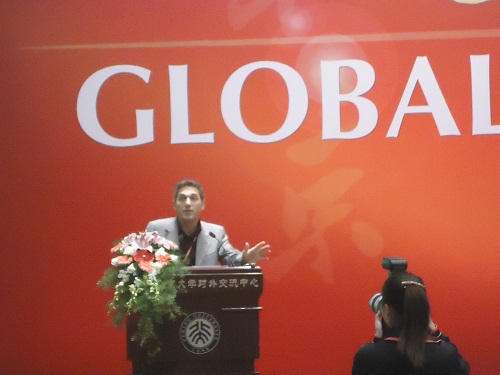Peking University, Oct. 24, 2011: Sustainable growth may have become an overused term, but it is certainly one of the innovative hot spots of our time. Facing challenges of unprecedentedly constrained natural resources, increasing costs associated with conventional energy acquisition and consumption, continuous emissions from global industries with the potential of contributing to climate change, the world needs resolutions.
In such context, 2011 Global Engineering Dean's Council (GEDC) Conference focused on how engineering education can contribute. The morning plenary session on the previous Saturday found one possible resolution.
As Eric Rondolat, Executive Vice-President of Pwer Business unit, Schneider Electric Asia-Pacific phrased it, “The solution is a combination of cleaner energy generation and consumption efficiency”, and “students are part of the generation to solve these problems”.
In his speech How Students will Help Solving the Energy Dilemma on the last morning of GEDC 2011 Conference, Mr.Rondolat explained energy stakes and explored what it means for universities as they educate the young people who will tomorrow deal with energy issues. He presented how Schneider Electric could contribute as a global corporation leader in energy management and had given examples of previous and on-going programs to promote engagement of young minds in industry. There are programs from children, students and professionals respectively. And with universities alone, there are Go Green in the City, Solar Decathion, Green Campus and Schneider Electric Energy Efficiency Contest, just to name a few. By the look of them, these Schneider Electric initiated or sponsored collaborative programs are fun and beneficial. By working together at innovative stage of technology, a win-win type of relationship is established: companies get the extra fresh mind power their R&D needs, while students get the opportunity to try themselves out.

Judging by the evident enthusiasm and hope in the hall among audience during the break, colliding corporations and young intellectuals’ innovative power together is clearly regarded as a promising approach, not just in sustainable energy use but science and technology in general. Other universities and companies either have or are going to promote such connection between academic and industrial worlds. Our reporter interviewed some scholars and government officials at present for their opinions on bringing young minds to the real world.
Professor Douglas Goering, Ph.D. CEM Dean at University of Alaska Fairbanks told our reporter, “At our university, programs are tailored to help industries. For example we have a mining engineering program which is not available in all universities, but it corresponds with the specific industrial needs in Alaska, where natural resources like oil are abundant.” Professor Goering also believes that it is university’s regional responsibility to involve industry into its curriculum. When asked to comment on the cooperative relationship between companies and college engineering department, he added, “It is of course beneficial for universities and companies to cooperate, but I also agree with Professor Jie Zhang (in his previous speech) that sometimes such relationship is a little tricky.” In his opinion, government should be the third party in such collaboration and also play an important role.
Ms. Usha R. Sharma, Government Commissioner and Secretary of the government of Punjab, India, confirmed such trend and need of engineering education meeting the needs of industry. She pointed out that the key word of higher education in India is “employability”. “Industries set up the requirements and universities design courses to meet them. In this way, university graduates would have no problem finding a good job in the industry, which will help them become better and happier citizens.” She elaborated, with heart-felt care for active young minds of her country. In her opinion, China and India are both transitional countries with high growth rate, which means in order to facilitate such growth, education should focus on educating competent young professionals for industries.
All in all, the world likes to keep its challenges new and fresh. Fortunately, matching such challenges are the equally new and fresh opportunities. Stated as one of the aims of the GEDC Conference, addressing the challenges is to purposefully explore changes needed in engineering education to ensure that the our future engineers are well-prepared. Or as Mr.Eric Rondolat phrased it, “Students are part of the generation to solve these problems”.
Written by: Li Xiaomeng